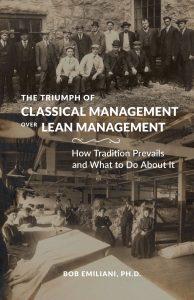
One of W. Edwards Deming‘s great accomplishments was his creation of the “System of Profound Knowledge” (read more details here). The System of Profound Knowledge (SoPK) is described in Deming’s book, The New Economics. In its most basic terms, SoPK is a framework designed to enable progress in the practice of management, and hence progress in business, organizations, and society.
Deming recognized that the classical ways in which organizations are led and managed are archaic, bad for business, bad for people, and unable to keep up with the times. So he developed a framework, which, if adopted and practiced diligently by leaders, would transform organizations and result in better outcomes. SoPK was based on a combination of careful observation of the better-led and better-managed organizations, and precise, logical deductions of the thinking and practices that are effective (or ineffective). It is based on a systems-view of people and processes.
As is well-known by many, Toyota’s management system (TMS), and its derivative, Lean management (LM), is also based on a systems-view of people and processes. Deming’s SoPK, TMS, and LM all share similar characteristics in terms of laying the groundwork, in mindset, rules, and methods, for making sustained progress – i.e. to continuously improve, and do so in ways that respect humans, develop their capabilities, and which cause no harm.
SoPK, TMS, and LM are forms of progressive management have been around for 30 or more years. These are wonderful, practical improvements to archaic classical management; so good, in fact, that they are worthy of replacing classical management in its entirety. Such transformations have proven to be exceedingly rare, driven by the choices made by a few brave CEOs determined to lead and manage organizations differently than is usual. We are fortunate to have some good examples of transformed businesses that indisputably validate the work of Deming and others. But, as you will learn below, these wonderful examples (e.g. Toyota, Wiremold, Virginia Mason, etc.) are closer to a few happy accidents than they are to overturning the status quo.
The questions is, why hasn’t SoPK, TMS, and LM overtaken the inferior (classical) approach to leadership and management on a much broader scale? Unfortunately, the speculations and commonplace insights proffered over the decades have done nothing to satisfactorily answer this tremendously important question. Said another way, why is the status quo (classical management) preferred so much more than progress (progressive management)? What has been missing is a detailed analysis of the antithesis of SoPK.

My new book, The Triumph of Classical Management, identifies a countervailing force that successfully obstructs SoPK (and TMS, and LM), and therefore progress: “System of Profound Privilege” (SoPP). It illuminates the nature of the status quo, much preferred by leaders, in comprehensive and uncomfortable detail. Specifically, it examines the interconnected and interdependent economic, social, political, historical, philosophical, legal, and business factors that has cemented the status quo and thus retards progress – progress that is much need, if for no other reasons than times change and humans evolve.
Over time, people expect better in every aspect of their work and life. They expect to move forward, not backwards, and expect their children to be better off than they were. This is a fundamental aspect of human existence; hope and belief in a better future, minimally tainted by the whims of our leaders who stand above us.
Yet, the two systems, SoPK and SoPP, are profoundly antagonistic. They work against one another, and SoPP has vast superpowers over SoPK. That is why Deming’s vision of leadership and management, TMS, and LM have been so difficult to realize in practice, to make things better for people, in work and in life.
Transformation from classical management to SoPK, TMS, or LM are rare because they disrespect the rights and privileges of leaders, which generates potent, though usually silent, opposition. Furthermore, many aspects of SoPP were enshrined into law (e.g. Natural Rights, property rights, ownership, free markets) and codified in policy long ago, and thus SoPP has become deeply embedded in the common sense of the population. As a result, SoPK (TMS and LM as well) will almost always be the loser in the competition between these two profound systems. To borrow a recently popular phrase, “the system is rigged” against SoPK, TMS, and Lean.
So how do we make greater progress than that we have experienced thus far? One option is to wait. We can wait for generational changes in leadership; people with different views of what constitute good leadership and good management, to drive the needed transformation in management practice. But we have been waiting more than 100 years for that, and the utility of SoPP seems far from being exhausted. Though, it is possible we could now be witnessing the beginnings of a generational change in leadership. However, don’t ever discount the power, determination, and effectiveness of arguments made by those who wish to prevent transformation or revert back to the status quo after transformation has been made.
A better option is to learn – rapidly. Change will begin to come about when both systems, SoPk and SoPP are recognized and understood. SoPK, TMS, and LM – the future state – are recognized and understood well-enough. What is not recognized or understood well enough is SoPP – the current state – and this lack of understanding has rendered the solutions to better management, SoPK, TMS, and LM, ineffective in producing the needed change. So, begin to understand SoPP, its scope and depth, by reading my book. The second step is to identify practical countermeasures, some of which are provided in the book, others you can think of yourself. The third step is to try the countermeasures, learn what happens, make adjustments, and try again. And keep trying. In other words, follow the PDCA cycle and don’t give up.
I conclude with the wise and memorable words of John Ruskin (Unto This Last [1862]; capitals in original): “THERE IS NO WEALTH BUT LIFE. Life, including all its powers of love, of joy, and of admiration. That country is the richest which nourishes the greatest number of noble and happy human beings; that man is richest who, having perfected the functions of his own life to the utmost, has also the widest helpful influence, both personal, and by means of his possessions, over the lives of others.”
That is what progressive management – SoPK, TMS, and LM – is trying help bring about. SoPP prevents that.
